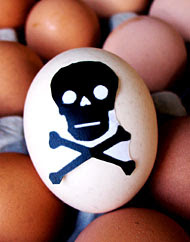Your stomach acid would kill most bacteria. There are very few that can actually hurt you from eating or drinking them... however the products they produce (toxins, chemicals, etc.) can hurt you. So, if you don't want to taste it, then don't.
Two things got ya here: lack of sanitizer and lack of yeast "take off". If the yeast colony had gotten going nice and good, they could have kept the bacteria in check, potentially. The beer might have had an "off" taste, but it would have been drinkable.
Sorry 'bout your beer.
I was going to make a smarmy remark about 'Botulism says hi', but after taking a moment to actually look up botulism, it's not the Clostridium botulinum (hurr, my big werd fer th'dai) that causes Botulism, but the products it makes during anaerobic conditions.






